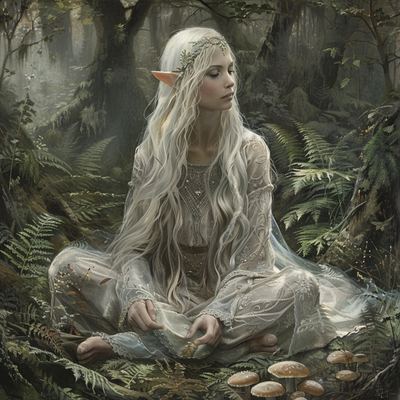The Sentience of Trees (essay)
Title: The Sentience of Trees (essay)
Author: Rohese Bayvel-Timbertree
First published on the 16th day of Fashanos in the year 5124
Introduction
Those familiar with elven customs will know that the Udienaeun (loosely meaning to walk or wander the trees) is a significant part of an Illistim elf's early education. Young elves are encouraged to observe the trees around them so that they might come to understand them, communicate with them, and, hopefully, establish a life-long relationship with them. Sceptics would say that trees are simply disconnected loners that cannot communicate but, whilst trees do not talk in the conventional sense, there is no doubt that they are sentient and do, in fact, converse with one another and others mindful enough to listen.
In my own search for the truth about my family, I stumbled across an intelligence - a web of interdependence - in the forests and woodlands of Elanthia and the trees were kind enough to share their secret with me. That secret being that there is a wisdom inherent in the give-and-take of nature; in its quiet agreements and search for balance; a sense of community, if you wish to put it in everyday vernacular. During my own Udienaeun, I communed mostly with my ancestors' memorial trees and they gradually revealed an intricacy of perceptiveness and responsiveness through a clandestine path of connections and conversations.
And it all starts with the Ama'aeun or Mother Tree.
The Mother Tree
Whether walking along the formal tree-lined pathways of Ta'Illistim's Veythorne Gardens or through the untamed Glimae'den Wildwood, there's a peculiar feeling of entering another world. One cannot fail to feel a sense of awe in the presence of such arboreal splendour. Who hasn't entered the deep woods of the Red Forest or the bog oak forest in the Wildwood of the Dryad and not noticed a palpable tension in the air. It is no surprise given all that the trees have witnessed over the decades, centuries and, in some cases, millennia. They are quite literally burdened with knowledge and have so much to share if we are only willing to engage with them and listen.
Each of these hallowed spaces is watched over by a guardian - a mother tree - the keeper of her aeunrend's (community of trees) ancient wisdom. These guardians are able to discern which seedlings are their own kin and will nurture their young, providing them with food and water - just as we do with our own children - as well as warn their neighbours when danger approaches.
A mother tree is often identifiable by its stature and location but this is not always the case. Whilst both the ancient glowbark in the Veythorne Manor gardens and the sovereign willow of the dryad wildwood tower over the other trees that surround them, the mother tree of the Glimae'den has yet to identify herself to me but her presence is certainly tangible. It may well be that the community of trees that make up this venerable wood is so old and extensive that there could be more than one.
A Community of Trees
Trees of the same species are communal and will often form alliances with trees of other species, especially in the smaller groves. They live co-operative, interdependent relationships maintained by communication and collective intelligence, all ruled over by a mother tree. Nestled among the towering, hardworking elders are teenaged saplings, and leaning into them are younger seedlings, all huddling as families do in the cold. These elders warn their neighbours when danger approaches and the young trees take foolhardy risks with frivolous leaf-shedding, light-chasing and excessive drinking -- usually paying with their lives. Those that manage to reach maturity await the fall of the elder trees so that they can take their place in the full glory of the sunlight and thrive.
During my research, I noticed that specific trees within these communities were vibrantly alive and charged with wonder. I realised that they were openly communicating with each other and some even deigned to include me in their "conversations" from time-to-time. The whisper-soft rustling of leaves, the creaking of branches, the slow, groaning shift of trunks in the wind: sometimes it feels like the very forest is dancing together in some secret conversation that we, with our limited senses, are not usually privy to.
But in order to understand or be part of this interaction, one must first seek out and identify the channels of communication. The alignment or layout of the most apperceptive trees within a community is actually not unlike the array of constellations visible in the night sky and, as such, can be mapped in the same way with the right devices and an unlimited amount of patience.
The Arboreal Constellation
Following the "conversations" over time, I learned that the network between the most cognizant trees is pervasive through the entire forest's community, connecting them in an identifiable pattern that can be documented and mapped (arborcartography). In some cases, these arboreal constellations extend beyond the boundaries of their own community connecting mother trees or tree hubs across the continent and the formation they revealed to me was astounding. If we were to continue with the cosmos analogy, it would be akin to a spiral galaxy. But that is beyond the scope of this paper.
As Above, So Below
So how exactly do these "conversations" take place? What are the methods of communication?
When trying to physically identify a tree, it normally starts with visual clues: the shape of the leaves, the texture of the bark, the appearance of its winter silhouette. Tuning in to the conversations of sentient trees is similar in the sense that you start by simply listening out for the audible clues. Standing quietly in a glade, it is possible to hear a psithurism, something straddling the line between music and mere noise. It's more than the susurration caused by the wind; it's a whisper of secrets, a murmur of voices, or an eerie ballad, and the trees often sing it in harmony.
Not every tree has something to say but those that do really want you to listen. Stand in the presence of the aforementioned glowbark tree, for example, and I defy you to not be drawn in by the shivering of its leaves, the swirls of rainbow-hued light, or occasional waves of incandescence. Stay and eavesdrop for a while, you might be surprised by what you learn.
But not all means of communication between the trees are audible. Leaf fall is a commonplace phenomenon that most of us take for granted as part of the cyclical seasonal changes but some of the leaves that are shed actually bear messages if one is adept at deciphering them. These leaf couriers have no outward physical signs to determine their purpose - trust me, I have spent months collecting and examining innumerable quantities of leaves under lenses in the Arboretum - but, under certain circumstances, their code can be cracked by spiritual means. No, I won't be sharing how because it is for every elf on their Udienaeun to discover for themselves; it is a very personal and sacred journey.
Birds are also known to assist in the carriage of messages, whether that is in the form of a leaf or twig or seed, often taking them long distances beyond the established constellation within one community to another.
Examination of bark and sap revealed similar properties too and tree bandits such as bark beetles and leafhoppers take full advantage of this - effectively data mining and stealing information - but the trees fight back. When trees come under attack from such insects, they respond by sending out warning signals and emitting deterrents. The other trees within the community can then defend themselves from subsequent invasion.
But it is beneath our feet that the most clandestine information sharing takes place. Linking trees in a symbiotic relationship is a network of roots and fungi. Out-of-sight and beyond our everyday hearing, this secret partnership works on the basis of supporting each other for the benefit of all; a true family and community. Cleverly concealed beneath the undergrowth is a covert messaging system made up of “mushroom mailboxes” and “telegraphic threads” called mycelium that connect the roots in an intricate web. Little is known about the weys and vars of this subterranean underworld; not unlike the rumoured activities beneath the paved and cobbled walkways of our own cities and towns. Perhaps it is best that it stays that way for fear of disrupting an efficient relay of information and services.
Communing with the Trees
Over time and with a little skill, it is possible to discern the trees within a community that are most likely to socialise. Communing with a tree is not a difficult process as long as a little humility is shown, especially if you are in the presence of a mother tree. Spend time with the tree, examine its bark and foliage - remembering to ask permission before taking anything from the tree itself - and learn its behaviours. Soon, the rustling and creaking sounds become decipherable and a lively two-way conversation can ensue. Be aware of leaf movements around you as they can add to the discussion as can the wildlife that likes to interrupt or join in.
Conclusion
A stand of trees is more than it seems. To the lumberjacks and timber traders in Bourth, the forest is merely a wood-producer. To the maidens of Riverwood, the woodland trees are witnesses to Jes'Tamaline night and their rite of passage to womanhood. Sylvan groves are a place of homage and celebration for the lives of the deceased through the ivethlyss (telling the trees) and the memorial trees or Anienaeun of the Illistimi play an important part of their life, death, and existence beyond the Ebon Gate.
To those who are willing to learn more about the quiet and cohesive way of the woods, trees are founts of knowledge and counsellors. They are matriarchs and monarchs. They are brothers and sisters. But most of all, they are friends. And, whilst a pile of fall leaves looks like a great place to have fun, stop for a moment and ponder what messages they may have conveyed over time.

